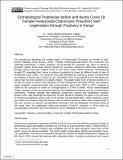| dc.description.abstract | The paradoxical liberating but limiting impact of Pentecostal Christianity on women is wellknown (Attanasi, 2013; Brusco, 2010). Female Pentecostal-Charismatic (PC) preachers are
asserting themselves in Africa. However, not all female PC preachers lay claim to having a
prophetic calling. Even fewer African female PC preachers proceed to share their prophecies
through various fora and medium which in turn meet unique African interests. Self-asserting
female PC’s negotiate their claims to religious leadership or power at different levels by way of
prophecies (Cox, 1995). The Covid-19 virus was identified as causing a cluster of pneumonia
and deaths in Wuhan city in China on 31st December 2019. It has spread across the world and
Kenya has not been spared of its deadly impact. This paper draws from empirical studies on a
female PC leader in Kenya, Jane Ndegwa1 of Hope Evangelistic Ministries (HEM)2 and analyses
select prophetic pronouncements and communication given from 2016 to 2021. Analysis is
based on the concepts of modes of self-legitimation in a field of power, African eschatological
hopes, Invasive versus non-invasive prophecy, Eschatological prophecy and the eschatological
community. Findings indicate that Ndegwa’s prophecies subvert the established symbolic
priestly order, and challenge the legitimacy of other priests to establish her place in the narrative
of herself as prophetess and as part of her identity and self-legitimation. HEM prophecies which
are mostly non-invasive bring the hearers into an eternal presence which when experienced in
the now, activate an eternal, eschatological dimension and eschatological community while at
the same time, her prophecies show that present Covid-19 concerns in Africa have an
eschatological dimension and must therefore not be relegated to the world to come. | en_US |

